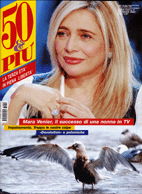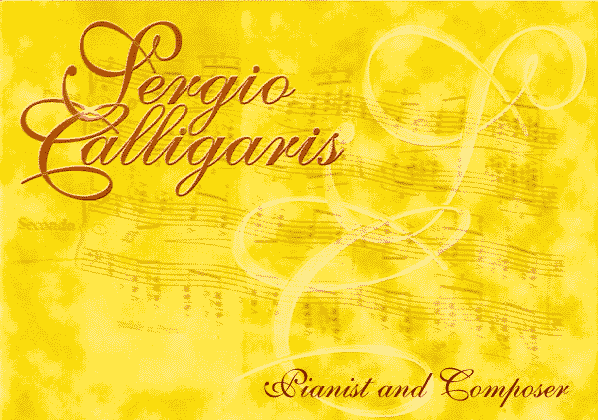 50&Più,
Year XXV - Nr.2
50&Più,
Year XXV - Nr.2
(Editoriale Cinquanta&Più Srl)
February 2003 (page 82):
Sergio Calligaris, sublime pianist
He begins to play in the heart of the night
by Paolo Giorgi
It is short before dawn that the musician sits down at his piano to
«train». Born in Argentina from Italian parents, Sergio Calligaris has gained success of
audience and critics all over the world. A characteristic of him: his big hands, unusual
for a virtuoso of pianism like him, but that run skilful and quick on the keyboard. His
début, at 13 only, with Beethoven's sonata «Opus 26». Unstoppable flow of enthusiasm,
Calligaris tells about the stages of his artistic life. His next concert will take place
in St.Petersburg.
To the less experienced it will sound like a heresy, and yet ars est celare artem,
the aim of art is to conceal itself, and this saying is to affix to the career, the
artistic creed of a great pianist as Sergio Calligaris, deeply convinced of the need of
rigour of a maniacally pursued technique, of an iron discipline in the constant avarice of
fiery attitudes or boring lyricisms during the performance.
His long arms draw imaginative ornaments while setting the events of a career, of a
novel-like life. His big hands, unusual for a virtuoso of pianism like him, seem now
vices, now claws, now huge shovels moved by a contagious vitality and enthusiasm.
Tireless, seductive narrator, in his delightful rooms in half-light where a piano towers,
that it is his life together with one of the mute keyboard, in his bedroom, on which he
daily trains, since twenty to five in the morning, with the enviable, innate perseverance
of the predestined ones.
And Sergio Calligaris, born in Argentina from Italian parents, felt very early to be
predestined. Imagine a beautiful bright home, residence of an engineer who plays piano,
guitar and violin very well, imagine a child, his son, stretched on all fours on a carpet,
with his two burning passions, mecano and the ballet: the first, clearly inherited
from his father, becomes ingenious wherewithal to fantastic stages, the other is a talent
from his mother's heritage, forever devoted to the classical ballet; the music from a
radio surrounds his games but when arising Glazunov's Seasons opus 67, when arising
those unforgotten notes, even with all the approximation of a child, Calligaris felt
clear, strong, his destiny of musician traced.
«I made my début as a pianist at 13, with Beethoven's sonata Opus 26 in A flat
major and works by Chopin and Rachmaninov, while an overwhelming wish arose in me to
undertake the American pianism. With American I intend that of the great talented exiles
gone in those days from Russia to the United States, a colony of pianists that imported a
sound and a way to play of great technical-athletic vitality; that population of Russian
immigrants taught to play, for instance, with strong adhesion to the keyboard, a
particular position of the hands for which I was never bored to play with my wrist watch.
Moreover, they required great composure, dispensed with inspired frills or contortions. I
admired one maestro among all, from my Argentina, Loesser and I came to him at 21 to
Cleveland, Ohio, to study and improve.»
And those studies were so profitable that in a short time Calligaris is professor in
that Faculty of piano which pupils are all much older than him, and at that point from
Cleveland it consents him to a sabbatic period in which the young talent, with an untiring
spirit and a rare moral tension, leaves to a series of concerts throughout Europe and
through a period of two years.
«I was a very tolerant teacher, as understanding as unyielding; I teach by playing and
replaying the piece for my pupils, including many Italians I've had when, moved to Italy,
I taught in Neaples at S.Pietro a Majella Conservatory, at Luisa D'Annunzio
in Pescara and at Alfredo Casella in L'Aquila. I loved Italy, the character of its
people, the smoothness of its climate, a bit less the lack of discipline that I've often
rebuked to many young pupils, very gifted but unable to rigour and constancy. As we can
see, in all most prestigious tournaments in the pianistic world, Asiatic, Oriental people
dominate, and... Argentinians: temperament and iron will. Technique and abnegation, that's
finally what I've always been preaching in all competitions where I'm juror. Also in
Italy, other than all over the world, the exceptional stature of Benedetti Michelangeli,
of Pollini is unquestioned, of that pianism, in short, without hedonism: musicians who are
anti-stars par excellence with a cold and calculated intensity, adjectives only apparently
contradicting the quality.»
In the gallery of Sergio Calligaris' loves, after the supreme and unreachable Robert
Schumann, parade Horowitz, Rachmaninov, Glenn Gould, although with some perplexity for
certain forced irreverence of him to the great tradition, Ashkenazy, his personal beloved
friend and dedicatee of the Sonata opus 38 for clarinet and piano, of the
Calligaris composer who already at 10, accomplice his love for ballet, composed the music
for one titled The Eternal Fight. And it seems an omen of what going on is, if we
think that in the same Cleveland Institute of Music the degree in composition also
is put aside for him... But let's go back to his concerts:
«Unforgettable at 24 that one at the Brahmssaal of the Musikverein in Vienna in which,
with the audacity of my green years and, pass my presumption, the consciousness of my
studies, I decide to play as first piece of the programme, the Rondò K.511 by W.A.Mozart.
Let's leave aside the wearing difficutly of the piece, but to play Mozart, in that
sanctuary and in Vienna seemed, mine, a vocation to suicide. The audience there follows
with the score on the knees, it's a very sophisticated palate, that of German people. I
were a young strolling fellow, I had played that piece a few hours before in Rome and then
in Madrid, I felt the grace at my side and when I sat at that Imperial Bösendorfer, five
keys more than the other pianos for sound, when the light lowered and I remained alone on
the scene, I produced a masterly performance. Let's get it quite clear, masterly for me
stands for the result of hours and hours of study, no flutters, improvisations or
acrobatics: technique and intensity, participation and wise detachment. A deafening
applause made the continuation, I guess it was Scriabin, come out divine. On the contrary,
I remember in Los Angeles a cold shiver along my back when, being about to play, I
realized I was going to a very painful concert, the piano I had long rehearsed with till
the afternoon had been replaced! For a concert performer these incidents are like a
catastrophe... But the show, as we know, must go on and it was this way that time too.»
Sergio Calligaris, unstoppable flow of enthusiasm, flies to his present, to his future:
the first one dense of concerts for purely humanitarian purpose, the latter, near, is in
the far St.Petersburg (built in 1703 by the talent of many Italians also), the Russian
city will hail his Prelude and Toccata opus 44 for piano solo, for the occasion
performed by Monaldo Braconi, pianist of the Accademia di Santa Cecilia, a commitment
requested to Calligaris by the publisher Carisch. There is also a Cd for the Warner
Chappell where a selection of Calligaris' music, chosen by the author bearing in mind even
the advertising creatives, can be used already in the form of jingle as music for
films or spots, to raise the quality level of this sector with cultured
compositions.
Meanwhile, through the living room windows, the sky of Rome oozes leaden shadows, the
elegant shape of this magnificent performer heads stealthy and sure for the piano, which
has long kept us mute company. Without affectation the Maestro takes off his glasses,
keeps his wrist watch and begins to play the sparkling rays tapping imaginary waves, the
strict and urgent phrasing in its gilded light the worrying whirlpool that seems to loom
up faraway, almost sinister omen for the boat imagined by Maurice Ravel on the Ocean, and
when the echo of the winding seas passes away and the silence returns, my applause is
soft, accomplice of that brief, intense emotion. Through the big hands, the huge fingers
of Sergio Calligaris, it seemed to be the enchantment of the memory of that sea he saw in
a far American morning: the Pacific Ocean in front of Santa Monica.
Paolo Giorgi
PAOLO GIORGI is a painter, considered among the most interesting ones by the
experienced critics: suffice it to recall the invitation to two editions of the
Quadriennale Nazionale, the exhibitions at the Museo del Folklore of Rome, at Palazzo
Lanfranchi of Pisa, an exhibition and the purchase of a painting of him by the Galleria
Comunale d'Arte Moderna e Contemporanea of Rome. He is represented in the collection of
the Banca Nazionale del Lavoro and of the Farnesina Ministry for Foreign Affairs. Keeping
pace with this, Giorgi has always cultivated an own singular space devoted to Letters, to
the writing of little essays, commentaries and remarks on subjects related to the cultural
debate. Fond of melodrama, he has written for a long time on the concert booklets of the
Teatro dell'Opera of Rome. He is among the editors of the monthly magazine Via Condotti,
to which he has contributed on great writers such as Melville, Proust, Joyce, musicians
such as Verdi and Wagner, painters such as Rubens, Vermeer, Francis Bacon. Also the
readers of 50&Più know the singular versatility of Giorgi writer, appearing he often,
in this guise too, in the pages of the magazine.

